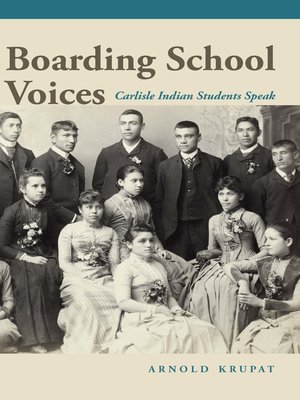
Sign up to save your library
With an OverDrive account, you can save your favorite libraries for at-a-glance information about availability. Find out more about OverDrive accounts.
Find this title in Libby, the library reading app by OverDrive.



Search for a digital library with this title
Title found at these libraries:
| Library Name | Distance |
|---|---|
| Loading... |
Boarding School Voices is both an anthology of mostly unpublished writing by former students of the Carlisle Indian Industrial School and a study of that writing. The boarding schools' ethnocidal practices have become a metaphor for the worst evils of colonialism, a specifiable source for the ills that beset Native communities today. But the fuller story is one not only of suffering and pain, loss and abjection, but also of ingenious agency, creative syntheses, and unimagined adaptations.
Although tragic for many students, for others the Carlisle experience led to positive outcomes in their lives. Some published short pieces in the Carlisle newspapers and others sent letters and photos to the school over the years. Arnold Krupat transcribes selections from the letters of these former students literally and unedited, emphasizing their evocative language and what they tell of themselves and their home communities, and the perspectives they offer on a wider American world. Their sense of themselves and their worldview provide detailed insights into what was abstractly and vaguely referred to as "the Indian question." These former students were the oxymoron Carlisle superintendent Richard Henry Pratt could not imagine and never comprehended: they were Carlisle Indians.
Although tragic for many students, for others the Carlisle experience led to positive outcomes in their lives. Some published short pieces in the Carlisle newspapers and others sent letters and photos to the school over the years. Arnold Krupat transcribes selections from the letters of these former students literally and unedited, emphasizing their evocative language and what they tell of themselves and their home communities, and the perspectives they offer on a wider American world. Their sense of themselves and their worldview provide detailed insights into what was abstractly and vaguely referred to as "the Indian question." These former students were the oxymoron Carlisle superintendent Richard Henry Pratt could not imagine and never comprehended: they were Carlisle Indians.







